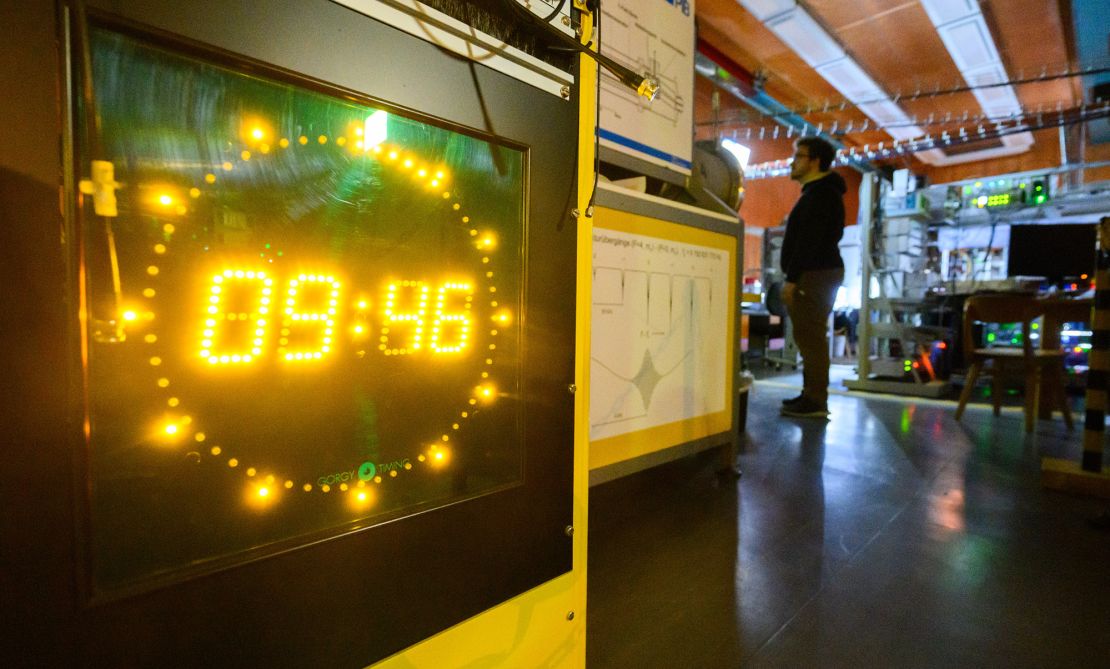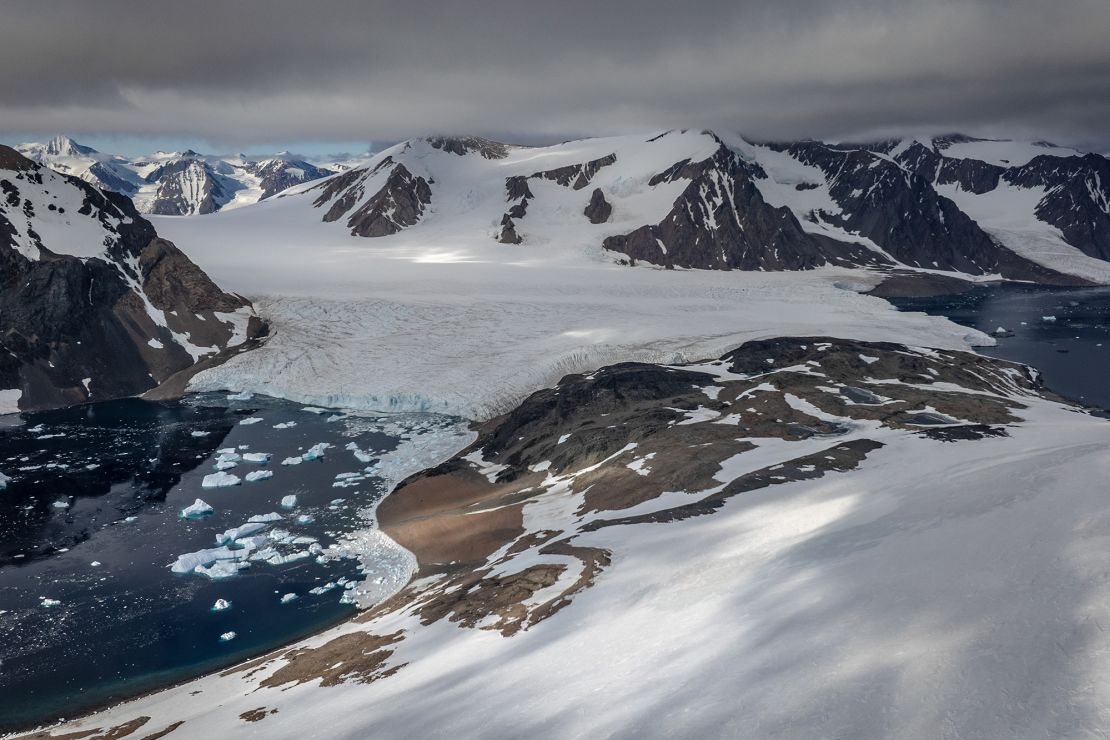Earth is spinning quicker, making days shorter — however why?
CNN
—
Earth is spinning quicker this summer season, making the times marginally shorter and attracting the eye of scientists and timekeepers.
July 10 was the shortest day of the 12 months thus far, lasting 1.36 milliseconds lower than 24 hours, in line with information from the Worldwide Earth Rotation and Reference Programs Service and the US Naval Observatory, compiled by timeanddate.com. Extra exceptionally brief days are approaching July 22 and August 5, presently predicted to be 1.34 and 1.25 milliseconds shorter than 24 hours, respectively.
The size of a day is the time it takes for the planet to finish one full rotation on its axis —24 hours or 86,400 seconds on common. However in actuality, every rotation is barely irregular as a result of quite a lot of elements, such because the gravitational pull of the moon, seasonal adjustments within the ambiance and the affect of Earth’s liquid core. Consequently, a full rotation normally takes barely much less or barely greater than 86,400 seconds — a discrepancy of simply milliseconds that doesn’t have any apparent impact on on a regular basis life.
Nevertheless these discrepancies can, in the long term, have an effect on computer systems, satellites and telecommunications, which is why even the smallest time deviations are tracked utilizing atomic clocks, which have been launched in 1955. Some specialists imagine this might result in a situation just like the Y2K drawback, which threatened to convey trendy civilization to a halt.
Atomic clocks depend the oscillations of atoms held in a vacuum chamber throughout the clock itself to calculate 24 hours to the utmost diploma of precision. We name the ensuing time UTC, or Coordinated Common Time, which relies on round 450 atomic clocks and is the worldwide normal for timekeeping, in addition to the time to which all our telephones and computer systems are set.

Astronomers additionally hold observe of Earth’s rotation — utilizing satellites that test the place of the planet relative to fastened stars, for instance — and may detect minute variations between the atomic clocks’ time and the period of time it truly takes Earth to finish a full rotation. Final 12 months, on July 5, 2024, Earth skilled the shortest day ever recorded for the reason that creation of the atomic clock 65 years in the past, at 1.66 milliseconds lower than 24 hours.
“We’ve been on a pattern towards barely quicker days since 1972,” stated Duncan Agnew, a professor emeritus of geophysics on the Scripps Establishment of Oceanography and a analysis geophysicist on the College of California, San Diego. “However there are fluctuations. It’s like watching the inventory market, actually. There are long-term developments, after which there are peaks and falls.”
In 1972, after many years of rotating comparatively slowly, Earth’s spin had gathered such a delay relative to atomic time that the Worldwide Earth Rotation and Reference Programs Service mandated the addition of a “leap second” to the UTC. That is just like the bissextile year, which provides an additional day to February each 4 years to account for the discrepancy between the Gregorian calendar and the time it takes Earth to finish one orbit across the solar.
Since 1972, a complete of 27 leap seconds have been added to the UTC, however the price of addition has more and more slowed, as a result of Earth dashing up; 9 leap seconds have been added all through the Nineteen Seventies whereas no new leap seconds have been added since 2016.
In 2022, the Basic Convention on Weights and Measures (CGPM) voted to retire the leap second by 2035, which means we could by no means see one other one added to the clocks. But when Earth retains spinning quicker for a number of extra years, in line with Agnew, finally one second would possibly must be faraway from the UTC. “There’s by no means been a destructive leap second,” he stated, “however the likelihood of getting one between now and 2035 is about 40%.”
The shortest-term adjustments in Earth’s rotation, Agnew stated, come from the moon and the tides, which make it spin slower when the satellite tv for pc is over the equator and quicker when it’s at larger or decrease altitudes. This impact compounds with the truth that through the summer season Earth naturally spins quicker — the results of the ambiance itself slowing down as a result of seasonal adjustments, such because the jet stream transferring north or south; the legal guidelines of physics dictate that the general angular momentum of Earth and its ambiance should stay fixed, so the rotation velocity misplaced by the ambiance is picked up by the planet itself. Equally, for the previous 50 years Earth’s liquid core has additionally been slowing down, with the strong Earth round it dashing up.
By wanting on the mixture of those results, scientists can predict if an upcoming day may very well be notably brief. “These fluctuations have short-period correlations, which implies that if Earth is dashing up on someday, it tends to be dashing up the following day, too,” stated Judah Levine, a physicist and a fellow of the Nationwide Institute of Requirements and Know-how within the time and frequency division. “However that correlation disappears as you go to longer and longer intervals. And if you get to a 12 months, the prediction turns into fairly unsure. In reality, the Worldwide Earth Rotation and Reference Programs Service doesn’t predict additional prematurely than a 12 months.”

Whereas one brief day doesn’t make any distinction, Levine stated, the latest pattern of shorter days is growing the potential of a destructive leap second. “When the leap second system was outlined in 1972, no person ever actually thought that the destructive second would ever occur,” he famous. “It was simply one thing that was put into the usual since you needed to do it for completeness. Everyone assumed that solely optimistic leap seconds would ever be wanted, however now the shortening of the times makes (destructive leap seconds) in peril of occurring, so to talk.”
The prospect of a destructive leap second raises considerations as a result of there are nonetheless ongoing issues with optimistic leap seconds after 50 years, defined Levine. “There are nonetheless locations that do it incorrect or do it on the incorrect time, or do it (with) the incorrect quantity, and so forth. And that’s with a optimistic leap second, which has been accomplished time and again. There’s a a lot larger concern in regards to the destructive leap second, as a result of it’s by no means been examined, by no means been tried.”
As a result of so many basic applied sciences programs depend on clocks and time to perform, reminiscent of telecommunications, monetary transactions, electrical grids and GPS satellites simply to call a number of, the arrival of the destructive leap second is, in line with Levine, considerably akin to the Y2K drawback — the second on the flip of the final century when the world thought a form of doomsday would ensue as a result of computer systems may need been unable to barter the brand new date format, going from ’99’ to ’00.’
Local weather change can also be a contributing issue to the difficulty of the leap second, however in a stunning manner. Whereas international warming has had appreciable destructive impacts on Earth, relating to our timekeeping, it has served to counteract the forces which might be dashing up Earth’s spin. A examine revealed final 12 months by Agnew within the journal Nature particulars how ice melting in Antarctica and Greenland is spreading over the oceans, slowing down Earth’s rotation — very similar to a skater spinning with their arms over their head, however spinning slower if the arms are tucked alongside the physique.
“If that ice had not melted, if we had not had international warming, then we might already be having a leap destructive leap second, or we might be very near having it,” Agnew stated. Meltwater from Greenland and Antarctica ice sheets has is chargeable for a 3rd of the worldwide sea stage rise since 1993, in line with NASA.

The mass shift of this melting ice will not be solely inflicting adjustments in Earth’s rotation velocity, but additionally in its rotation axis, in line with analysis led by Benedikt Soja, an assistant professor on the division of civil, environmental and geomatic engineering of The Swiss Federal Institute of Know-how in Zurich, Switzerland. If warming continues, its impact would possibly change into dominant. “By the top of this century, in a pessimistic situation (wherein people proceed to emit extra greenhouse gases) the impact of local weather change might surpass the impact of the moon, which has been actually driving Earth’s rotation for the previous few billions of years,” Soja stated.
In the meanwhile, probably having extra time to organize for motion is useful, given the uncertainty of long-term predictions on Earth’s spinning conduct. “I believe the (quicker spinning) remains to be inside affordable boundaries, so it may very well be pure variability,” Soja stated. “Possibly in a number of years, we might see once more a unique scenario, and long run, we might see the planet slowing down once more. That may be my instinct, however you by no means know.”
Join CNN’s Marvel Principle science publication. Discover the universe with information on fascinating discoveries, scientific developments and extra.

